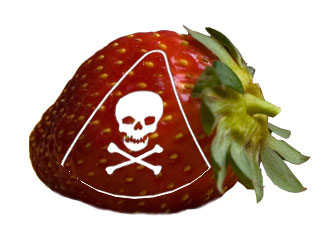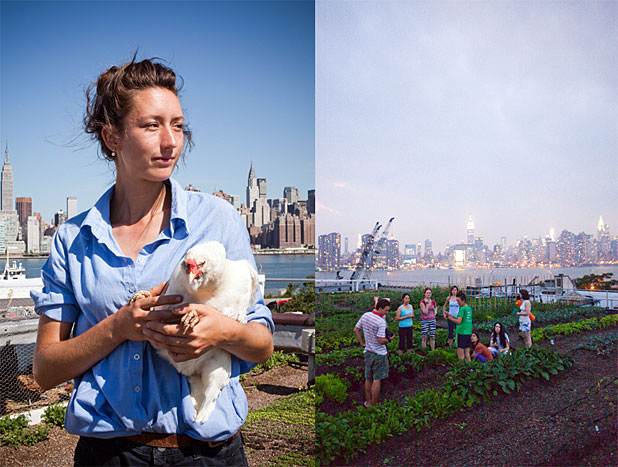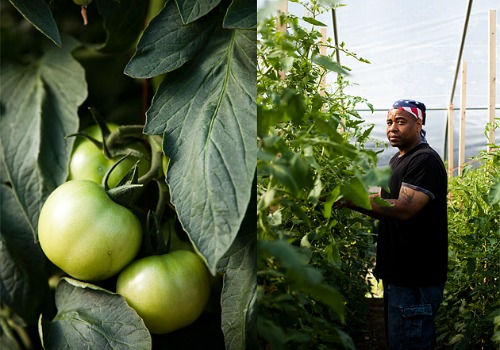January 2011 update: Many of the photos have been removed from this series so they can be published in a Breaking Through Concrete book, forthcoming this year from UC Press.
Karen Turner, 25, wants to farm 100 acres in Texas. Her family has lived on 10 acres in San Antonio since she was a child. She plans to start there with chickens, fruit trees, and vegetables, and eventually have a dairy farm.
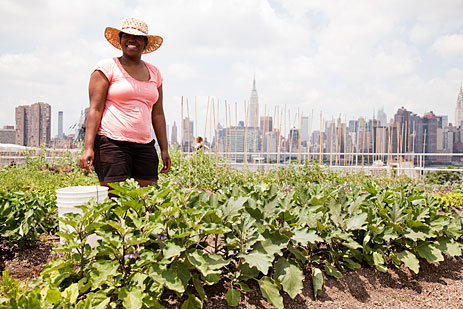 Karen Turner, a farm apprentice, wants to return to Texas to farm full-time.But today she’s in Brooklyn, NY, and she just carried a five-gallon bucket of used coffee grounds from a neighborhood café on a steamy-hot Wednesday. She brought the bucket into a warehouse and climbed two flights of stairs to the roof. Aphids are attacking a row of kale; something must be done. So Karen kneels between the neat rows on the 6,000-square-foot Eagle Street Rooftop Farm and spreads old espresso grounds around the plants. The Empire State building, a few miles away, pokes out of the top of her straw hat.
Karen Turner, a farm apprentice, wants to return to Texas to farm full-time.But today she’s in Brooklyn, NY, and she just carried a five-gallon bucket of used coffee grounds from a neighborhood café on a steamy-hot Wednesday. She brought the bucket into a warehouse and climbed two flights of stairs to the roof. Aphids are attacking a row of kale; something must be done. So Karen kneels between the neat rows on the 6,000-square-foot Eagle Street Rooftop Farm and spreads old espresso grounds around the plants. The Empire State building, a few miles away, pokes out of the top of her straw hat.
We’re a long way from Texas in every way except for that hat, this soil, the sun’s Southern-style beat-down, and the agricultural culture atop this roof.
Rooftop gardens and “living roofs” are the rage, especially in foodie-hip Brooklyn. In some ways the rooftop garden is the poster child for urban farming: clean, beautiful, with views, and atop the very thing that makes a city a city — big buildings with flat roofs. Their aesthetic and conceptual efficiency make them appealing vehicles for promoting the growing of food in urban environments.
And Eagle Street is the quintessential rooftop farm. It all got off the ground in late 2008. Goode Green, a green-roof business, got together with Greenpoint, Brooklyn warehouse owner Gina Argento, and former E*Trade man Ben Flanner to build a rooftop farm. Flanner brought in Annie Novak to direct the farming and planting aspect.
Flanner has since moved on to work on the larger Brooklyn Grange rooftop project. So Annie runs the farm with the help of an intern, a few apprentices, and volunteers. They grow beautiful produce for sale at their weekly market, run a small CSA, and sell to high-end Brooklyn restaurants such as Eat, Marlow & Sons, Manducati Rustica, Anella, Paulie Gee’s, and Vesta. That part’s easy in hyper-foodie Brooklyn. And local food carries enough value in this neighborhood to support the project as a for-profit endeavor.
In some ways the rooftop garden is the poster child for urban farming: clean, beautiful, with views, and atop the very thing that makes a city a city — big buildings with flat roofs.
With the media world lurking in the skyscrapers over the East River, publicity is not a problem, either. The media page on Eagle Street’s website bosts coverage by CNN, the New York Times, New York Magazine, Martha Stewart TV, CBS Evening News, etc.
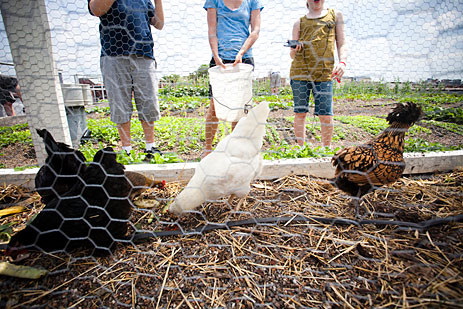 Students from the Friends summer camp in Manhattan visit the farm. Annie might rather be farming than entertaining film crews, but so it goes on a project intended to be as much about education and outreach as it is about arugula, city chickens, and tomatoes.
Students from the Friends summer camp in Manhattan visit the farm. Annie might rather be farming than entertaining film crews, but so it goes on a project intended to be as much about education and outreach as it is about arugula, city chickens, and tomatoes.
“We want to serve as a basis for potential,” Annie says. “Everything we do here on a small scale can be blown up in any way. It’s like a demo for everything. Because we’re in New York, we have a broad reach. If I’m doing this in a city, I want to have that connection to as many people as possible. Otherwise, I’d rather just be farming in upstate.”
Annie hopes her outreach on this rooftop with school groups from Manhattan, New Jersey, the Bronx, Brooklyn, Queens — and anyone who walks up the warehouse stairs to buy a bundle of radishes or four eggs — will gain an awareness of food. “The whole point of this project was to get people so excited about food that they support our upstate farms as consumers,” she says. The surprise factor — growing in the city as a surprise and growing on a roof as a bigger surprise — helps shock people into the whole agriculture thing.
Eagle Street is Karen Turner’s first experience actually growing food. She worked with livestock for a week in Arkansas via a Heifer International farm-stay. “For the first time, during that farm stay,” she says, “I felt I was where I was supposed to be. And then I really came to that conclusion a month ago.”
Karen heard of Eagle Street through her Food Studies masters program at NYU. Her father died when she was young, so the San Antonio farm, managed by her mother, grows only hay now. Karen says the land is capable of supporting the farm she wants to start after a few years.
She’s in full training mode, reading books about farming, planting at night, and practicing new skills with Annie atop this roof overlooking city. “Monday, I helped build the third pallet compost bin and that’s the system I’ll need in Texas. Everything gets me pumped right now,” she says. “I can’t wait to do that when I get home.”
All material ©Breaking Through Concrete. For questions regarding use of images, video and/or, text, please contact btctour@mail.com.
